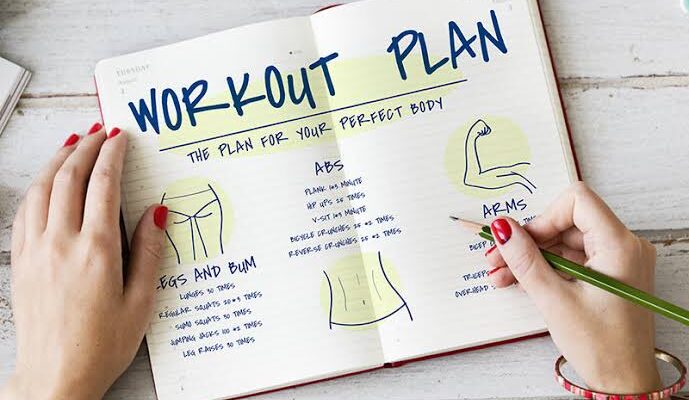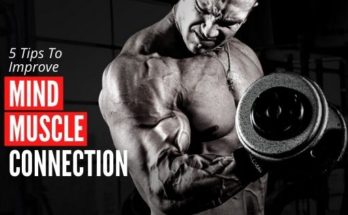One of the reasons you are not achieving your fitness goal is that you don’t keep track of your macros, training schedule, how many sets you are doing, how your weight fluctuates, your training volume, etc.
Hitting the gym and eating healthy is good but not enough if you have serious fitness goals. You have to log each detail to achieve that dream physique. And this is where a fitness journal or fitness log comes into play.
In this article, you’ll get to know everything about keeping a fitness log and how it can help you in achieving your fitness goals.
What Is Fitness Journal
A journal is a notebook in which you log your daily activities or jot down your thoughts and ideas regarding something. So a fitness journal is one in which you record only about your fitness journey.
You can use a simple pen and paper to do this. It would be better if you have a journal that is specifically designed for fitness. A good fitness journal is customized for logging your training schedule, diet, exercises, training volume, etc.
You can also include the number of reps, tempo, rest time, energy levels, and sleep schedule. It’s a small investment in your health that will help you attain your fitness goals.
What To Note Down In A Fitness Journal
You might be thinking about what you need to jot down in your fitness journal. Well, don’t worry, here are the essential aspects of workout and nutrition that you need to jot down in your fitness log.
About Training
1. Training split: Before going to the exercises and all, you need to decide your training split. Be it push-pull legs, upper and lower body, bro split, or whichever training split you have decided, mention it in your journal.
2. Which body part have you trained today: Always enter the gym with a pre-determined plan in your journal about which muscle and what exercises you have to do.
3. Exercise (sets, reps, and volume): After finishing the workout, note down how many sets and reps you have done for each exercise. Also, calculate the total workout volume. This information will help you in progressive overloading.
4. Cardio: Whether your goal is to lose fat or gain muscle, some form of cardiovascular training must be in your workout plan. It helps in improving your heart health and in burning some extra calories.
Whatever exercise you do – running, cycling, rope skipping, jot down its duration and intensity.
About Diet
1. Daily macros and calories: To get a fit muscular body, nutrition is as important as training. So keep a daily record of the number of calories you are consuming. You can easily manage your weight by manipulating your daily calories.
Now weight can be managed by manipulating the number of calories. But to gain muscle or to increase your muscle-to-fat ratio, you have to manage your macronutrient (protein, carbs, and fat) intake.
So make sure to note down your daily intake of protein, carbs, fat, and number of calories.
2. Meal frequency and timing: Note down how many meals you are having and at what time. However, this part is not that important. You can skip this if you are not a professional bodybuilder.
About your Body
1. Body weight: No matter what your goal is, you have to keep an eye on your body weight. By doing this you can keep a check on your weight which will help you in managing your workout regime and daily calorie intake.
2. Body stats: Here you have to measure certain parts of your body. This includes the chest, shoulders, biceps, forearms, waist, hips, thighs, and calves.
This is the major thing that can give you an accurate analysis of your progress. But you don’t need to record your body stats daily as it doesn’t change rapidly.
You can jot down your body stats once in two weeks or once in a month. This will give you a perfect report that with what pace you are going toward your goal.
3. Fat percentage: Having only size is not enough. Someone having 16-inch biceps with 12% body fat would have a more fit and attractive physique than the person with 20% body fat.
Hence, you have to keep an eye on your body composition (muscle-to-fat ratio), and for that, you need to jot down your fat percentage.
You can measure it along with your body stats by using a body fat caliper.
5 Benefits of Maintaining A Fitness Journal
Sometimes it might be tedious to log everything regarding your workout, diet, and body stats. But trust me, doing this with discipline can give you many benefits.
Keeps you consistent
As James Clear said in his book ‘Atomic Habits’, ‘your chances of doing something increase if you write that activity with enough details‘. And that’s where a fitness journal benefits you when it is about achieving your fitness goals.
So what you need to do is, just jot down at night what workout you will do and at what time you are gonna hit the gym tomorrow. This daily practice will increase your consistency in hitting the gym.
Also, you must have heard that ‘consistency is the key‘ to achieving any fitness goal. So maintaining a fitness journal helps you keep you consistent which further helps you in achieving your fitness goals.
Keeps you on Track
You might know what you have to do to get that dream physique but staying on track with your training and nutrition is the biggest challenge. This is where your fitness journal helps you.
After two weeks of the gym, the slight changes are unnoticeable by the naked eye but your body stats catch them. That section of your journal will notify you about that small progress of those 2 weeks which other people can not notice.
That slight progress tells you that you are on the right track which keeps you motivated throughout the journey.
Helps in Progressive Overloading
Progressive overloading is an important concept in bodybuilding. This simply means to gradually increase the load on your muscles. By doing this you give your muscles a reason to grow.
However, if you don’t know how much you lifted in the previous session then you won’t be able to use this principle successfully. This is where your workout log comes in handy.
Keeps you accountable
Writing down your daily actions will keep you accountable for your goals. This also helps you to be honest with yourself.
Analyze and Strategize
This is the most important benefit of maintaining a fitness journal. When you have track of all your actions then you can analyze what’s working for you and what’s not.
You can change your daily calories, protein intake, training frequency, number of reps, etc, depending on your goal and performance.
Like if your goal is to gain muscle but your weight has not increased for a month, that means you are not in a caloric surplus. This is a clear indication that you need to increase your daily calories to gain muscle.
The Takeaway
So this was the article explaining how and why you need to maintain a fitness journal. In a nutshell, this is what you need to do.
- Buy a good fitness journal.
- Just take out 5-10 minutes before sleep.
- Log all your workout and diet-related aspects including body weight, exercises, sets, reps, volume, muscle trained, calories, and macros, and note down how you feel about following your plan.
- Also, write down about your next day’s workout.
- Once a month, take your body stats and fat percentage.
- At last, be honest with yourself.




